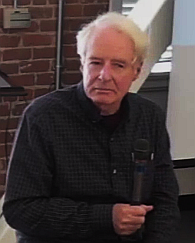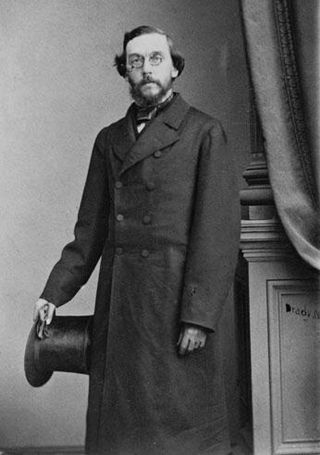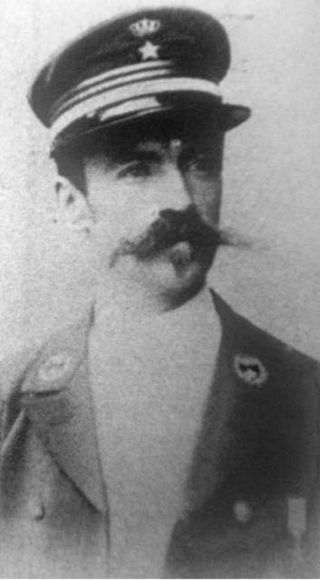| |||||
| Decades: | |||||
|---|---|---|---|---|---|
The following lists events that happened during 1903 in the Congo Free State .
| |||||
| Decades: | |||||
|---|---|---|---|---|---|
The following lists events that happened during 1903 in the Congo Free State .
| Date | Event |
|---|---|
| Herzekiah Andrew Shanu supplies Roger Casement with information concerning the abuse of West African workers in the Congo. [1] |

Leopold II was the second King of the Belgians from 1865 to 1909, and the founder and sole owner of the Congo Free State from 1885 to 1908.

The Congo Free State, also known as the Independent State of the Congo, was a large state and absolute monarchy in Central Africa from 1885 to 1908. It was privately owned by King Leopold II, the constitutional monarch of the Kingdom of Belgium. In legal terms, the two separate nations were in a "personal union". The Congo Free State was not a part of, nor did it belong to Belgium. Leopold was able to seize the region by convincing other European states at the Berlin Conference on Africa that he was involved in humanitarian and philanthropic work and would not tax trade. Via the International Association of the Congo, he was able to lay claim to most of the Congo Basin. On 29 May 1885, after the closure of the Berlin Conference, the king announced that he planned to name his possessions "the Congo Free State", an appellation which was not yet used at the Berlin Conference and which officially replaced "International Association of the Congo" on 1 August 1885. The Free State was privately controlled by Leopold from Brussels; he never went there.

King Leopold's Ghost: A Story of Greed, Terror and Heroism in Colonial Africa (1998) is a best-selling popular history book by Adam Hochschild that explores the exploitation of the Congo Free State by King Leopold II of Belgium between 1885 and 1908, as well as the large-scale atrocities committed during that period. The book, also a general biography of the private life of Leopold, succeeded in increasing public awareness of these crimes in recent decades.

Adam Hochschild is an American author, journalist, historian and lecturer. His best-known works include King Leopold's Ghost (1998), To End All Wars: A Story of Loyalty and Rebellion, 1914–1918 (2011), Bury the Chains (2005), The Mirror at Midnight (1990), The Unquiet Ghost (1994), and Spain in Our Hearts (2016). American Midnight: The Great War, A Violent Peace, and Democracy’s Forgotten Crisis (2022.)

The Royal Museum for Central Africa (RMCA), communicating under the name AfricaMuseum since 2018, is an ethnography and natural history museum situated in Tervuren in Flemish Brabant, Belgium, just outside Brussels. It was originally built to showcase King Leopold II's Congo Free State in the International Exposition of 1897.

Edmund Dene Morel was a French-born British journalist, author, pacifist and politician.
The Congo Reform Association (CRA) was a political and humanitarian activist group that sought to promote reform of the Congo Free State, a private territory in Central Africa under the absolute sovereignty of King Leopold II. Active from 1904 to 1913, the association formed in opposition to the institutionalised practices of Congo Free State's 'rubber policy', which encouraged the need to minimise expenditure and maximise profit with no political constraints – fostering a system of coercion and terror unparalleled in contemporary colonial Africa. The group carried out a global publicity campaign across the Western world, using a range of strategies including displays of atrocity photographs; public seminars; mass rallies; celebrity endorsements; and extensive press coverage to lobby the Great Powers into pressuring reform in the Congo. The association partially achieved its aims in 1908 with the Belgian government's annexation of the Congo Free State and continued to promote reform until disbanding in 1913.

Belgium controlled several territories and concessions during the colonial era, principally the Belgian Congo from 1908 to 1960, Ruanda-Urundi from 1922 to 1962, and Lado Enclave from 1884 to 1910. It also had small concessions in Guatemala (1843–1854) and Belgian concession of Tianjin in China (1902–1931) and was a co-administrator of the Tangier International Zone in Morocco.

Henry Shelton Sanford was a wealthy American diplomat and businessman from Connecticut who served as United States Minister to Belgium from 1861 to 1869. He is also known for founding the city of Sanford, Florida and for successfully lobbying the United States into recognizing King Leopold II's claim to the Congo region in central Africa, the area that would become Leopold's privately controlled Congo Free State.

The International Association of the Congo, also known as the International Congo Society, was an association founded on 17 November 1879 by Leopold II of Belgium to further his interests in the Congo. It replaced the Belgian Committee for Studies of the Upper Congo which was part of the International African Association front organisation created for the exploitation of the Congo. The goals of the International Congo Society was to establish control of the Congo Basin and to exploit its economic resources. The Berlin Conference recognised the society as sovereign over the territories it controlled and on August 1, 1885, i.e. four and half months after the closure of the Berlin Conference, King Leopold's Vice-Administrator General in the Congo, announced that the society and the territories it occupied were henceforth called "the Congo Free State".

Omer Bodson was the Belgian officer who shot and killed Msiri, King of Garanganze (Katanga) on 20 December 1891 at Bunkeya in what is now the DR Congo. Bodson was then killed by one of Msiri's men.

Léon Auguste Théophile Rom (1859–1924) was a Belgian soldier and mid-ranking colonial official, military officer, and commercial agent in the Congo Free State. His reputation for brutality has led some to speculate that Rom served as an inspiration for the character of Mr. Kurtz in Joseph Conrad's 1899 novella Heart of Darkness.

Herzekiah Andrew Shanu was a photographer recognized for his involvement in the campaign against abuses in the Congo Free State.

Blanche Zélia Joséphine Delacroix, better known as Caroline Lacroix, was the most prominent and notorious of Leopold II of Belgium's mistresses.

The International African Association was a front organization established by the guests at the Brussels Geographic Conference of 1876, an event hosted by King Leopold II of Belgium. The Association was used by King Leopold ostensibly to further his purportedly altruistic and humanitarian projects in the area of Central Africa, the area that was to become Leopold's privately controlled Congo Free State. King Leopold volunteered space in Brussels for the International African Association's headquarters, and there were to be national committees of the association set up in all the participating countries, as well as an international committee. Leopold was elected by acclamation as the international committee's first chairman, but said that he would serve for one year only so that the chairmanship could rotate among people from different countries.

The Congo Free State propaganda war was a worldwide media propaganda campaign waged by both King Leopold II of Belgium and the critics of the Congo Free State and its atrocities. Leopold was very astute in using the media to support his virtual private control of the Congo. British campaigner Edmund Dene Morel successfully campaigned against Leopold and focused public attention on the violence of Leopold's rule. Morel used newspaper accounts, pamphlets, and books to publish evidence from reports, eye-witness testimony, and pictures from missionaries and others involved directly in the Congo. As Morel gained high-profile supporters, the publicity generated by his campaign eventually forced Leopold to relinquish control of the Congo to the Belgian government.
Jules Marchal was a Belgian diplomat and historian, who wrote extensively on the history of colonial exploitation in the Belgian Congo. Originally writing in Dutch, under the pseudonym A. M. Delathuy, he later published studies in French under his own name. Adam Hochschild, in his bestselling King Leopold's Ghost, praised Marchal's work as "the best scholarly overview by far, encyclopedic in scope".
Henry Wellington Wack was an American attorney and writer noted for being an apologist for Leopold II's regime of the Congo Free State.

In the period from 1885 to 1908, many atrocities were perpetrated in the Congo Free State which, at the time, was a state under the absolute rule of King Leopold II of the Belgians. These atrocities were particularly associated with the labour policies used to collect natural rubber for export. Together with epidemic disease, famine, and a falling birth rate caused by these disruptions, the atrocities contributed to a sharp decline in the Congolese population. The magnitude of the population fall over the period is disputed, with modern estimates ranging from 1.5 million to 13 million.
Relations between the Congo Free State and the United States began after recognition between the two states in 1885 when the Congo Free State was established. After Belgium under Leopold II annexed the Congo Free State in 1908, later becoming Belgian Congo, relations ceased between the two nations.